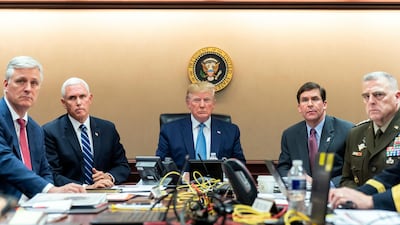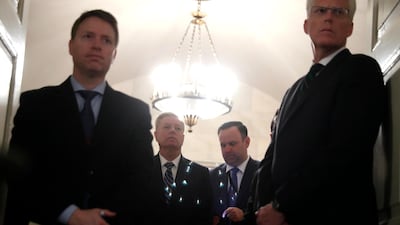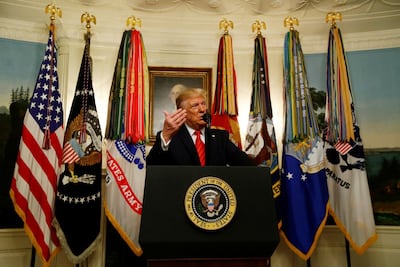ISIS leader Abu Bakr Al Baghdadi was killed in a US Special Operations commando raid in the north-west Syrian province of Idlib, US President Donald Trump said on Sunday.
Mr Trump said the elusive militant chief, who led the organisation that overran large areas of Iraq and Syria, was the target of the overnight mission in the village of Barisha.
The Kurdish militia that led the fight against ISIS also claimed they killed ISIS spokesman Abu Hassan Al Muhajir near the Syrian border town of Jarablus in a raid with US forces on Sunday.
"Last night, the United States brought the world's number one terrorist leader to justice. Abu Bakr Al Baghdadi is dead," Mr Trump said. "He was a sick and depraved man, and now he's gone."
He said no American troops were killed in the mission.
"US special operations forces executed a dangerous and daring nighttime raid and accomplished their mission," Mr Trump said.
He said the terrorist leader killed himself by detonating an explosive vest after running into a tunnel.
Mr Trump said Al Baghdadi died like "a dog" and "a coward".
"He died after running into a dead-end tunnel, whimpering and crying and screaming all the way," he said. "The compound had been cleared by this time."
Mr Trump said Al Baghdadi also killed three of his own children, although it was not clear whose they were.
"He had dragged three of his young children with him," he said. "They were led to certain death. He reached the end of the tunnel as our dogs chased him down."
Mr Trump said that DNA tests after the raid identified Al Baghdadi.
The mission was approved by the US president last week to take place in the last major rebel-held bastion in Syria.
The US had obtained information about his whereabouts a week earlier, Mr Trump said.
During the raid, he sat in the situation room with US Vice President Mike Pence, Defence Secretary Mark Esper and several top generals.
"We had him scoped," Mr Trump said.
The death of Al Baghdadi gives the president a major victory after weeks of criticism about his decision to withdraw troops from northern Syria, which led to a Turkish offensive against allied Kurdish fighters that killed dozens.
At least seven other people were killed in the raid, which was named after slain ISIS hostage and US citizen Kayla Mueller.
They included Al Baghdadi's two wives, his bodyguard Gazwan Al Rawi, his personal assistant Abu Saaed Al Iraqi, and Abu Al Yaman Al Shami, who was in charge of ISIS’s security in Syria.
Abu Mohammed Al Halabi, the senior leader of a militant organisation in Idlib known as the Hurras Al Din, also died in the blast, a security adviser to the Iraqi government told The National.
Al Baghdadi was living in Al Halabi’s house, hundreds of kilometres from where he was believed to be hiding.
It had long been thought in intelligence circles that he was in ISIS-controlled pockets along the Syrian-Iraqi border.
But ISIS lost their last sliver of territory in March when the hamlet of Baghouz was reclaimed by the Syrian Democratic Forces, an Arab-Kurdish coalition of fighters leading the battles against the extremists in Syria.
Iraq confirmed on Sunday that its National Intelligence Service uncovered Al Baghdadi's location and provided it to the US.
"After constant monitoring and the formation of a specialised task force over an entire year, the Iraqi National Intelligence Service acting on accurate information was able to locate the den in which Al Baghdadi and those with him were hiding in the Syrian province of Idlib," the Iraqi military said.
“The Iraqi intelligence services managed to recruit a member of that network in exchange for a large sum of money."
Another Iraqi official said the country's intelligence services provided the exact co-ordinates of Al Baghdadi's location after arresting two members of his inner circle.
Their arrests led them to a safehouse in western Iraq and more evidence about his plans in Syria, the official told Reuters.
The raid in the early hours of Sunday involved helicopters, warplanes and fighting in Barisha, in Syria's Idlib province bordering Turkey, a commander of a militant faction said.
The attack was carried out using eight helicopters, observers said. The commander said surveillance planes were also used.
Syria's top Kurdish commander said he welcomed the "historic operation".
Mazloum Abdi, head of the Kurdish-led SDF, said the operation was the result of "joint intelligence work".
“For five months there has been joint intel co-operation on the ground and accurate monitoring, until we achieved a joint operation to kill Abu Bakr Al Baghdadi,” he tweeted.
SDF spokesman Mustafa Bali said: “Successful and effective operation by our forces is yet another proof of SDF’s anti-terror capability.
"We continue to work with our partners in the global coalition in the fight against ISIS terrorism."
Mr Abdi said Al Muhajir was hit near Syria's border town of Jarablus through efforts between SDF intelligence and the US military.
He called it "a continuation of the previous operation" to capture Al Baghdadi.
Turkish and US military authorities exchanged information before the operation, the Turkish Defence Ministry said on Sunday.
A Turkish official said on Sunday that Al Baghdadi arrived at the site in Syria 48 hours before the mission.
The official said there had been close co-ordination between all parties and that the Turkish military had advance warning of the raid.
Turkish President Recep Tayyip Erdogan said the death of Al Baghdadi marked a "turning point" in the fight against terrorism.
Bahrain's Foreign Minister, Sheikh Khalid bin Ahmed, tweeted that the terrorist chief's killing was a fatal blow to ISIS.
Al Baghdadi has been in hiding for five years and the US had offered a reward of $25 million (Dh91.8m) for his capture or death.
He last appeared on September 16 in a 30-minute audio message. He has been reported dead on several occasions.
ISIS's hold in Syria and Iraq was destroyed after almost five years of occupation, led by a range of international forces including the US, the Iraqi military, European armies and the Syrian regime.
Meanwhile, western officials and experts warned that the US withdrawal of about 1,000 troops from Syria and the Turkish offensive against the Kurds could allow for a resurgence of ISIS in the country.
US Defence Secretary Mark Esper has confirmed that more than 100 ISIS militants escaped from prison in Kurdish-held territory in Syria since the Turkish offensive began.
But Mr Trump said the raid had "nothing to do with this" operation in northern Syria.
Analysts say Al Baghdadi's reported residence in Idlib, if confirmed, would be surprising because it is largely held by rival militant factions that have clashed with ISIS in north-west Syria.
The dominant faction in Idlib is Hayat Tahrir Al Sham, formerly known as Jabhat Al Nusra, which was once allied to Al Qaeda before disavowing the group in a bid to clean its international image.
























